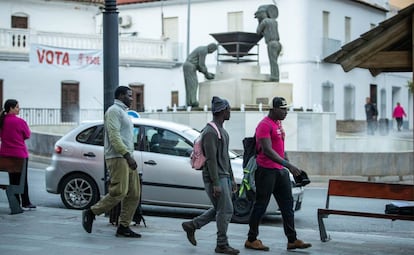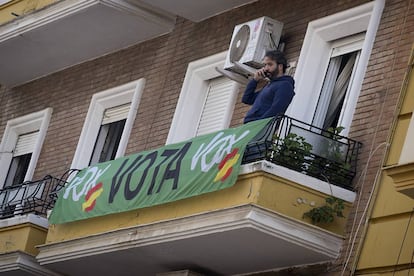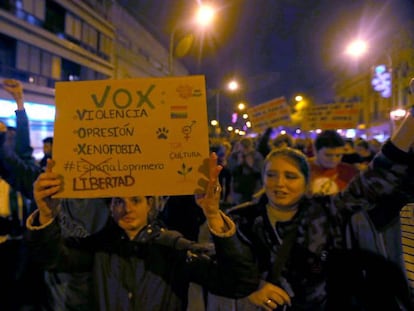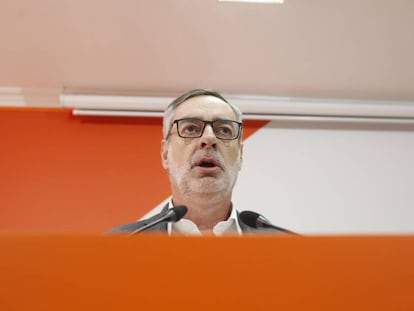Rise of the far right in Spain: A visit to three municipalities that voted for Vox
The anti-immigration party has made significant gains in former Popular Party strongholds, where migration and unemployment are seen as problems

Far-right group Vox has shaken up the political landscape of southern Spain. The party received almost 400,000 votes at the Andalusian regional elections on Sunday, and will for the first time have elected deputies in parliament. The rise of the far-right party has been particularly significant in traditional strongholds of the conservative Popular Party (PP), such as El Ejido (Almería) and Los Remedios (Seville). Albuñol (Granada) was won by the Socialist Party (PSOE) but Vox made a surprising jump into third place there. Here is a visit to the three municipalities.
El Ejido
On Monday in La Redonda, five kilometers from El Ejido (Almería), where dozens of small farmers come to sell their wares, the conversation centered on one thing: the 12 deputies Vox had won in the Andalusian regional election, two of them in Almería. Located in the southeast of the province, El Ejido is home to 89,000 residents and is covered with greenhouses. Agriculture is the main economic driver.
They are against immigration but at the same time they need the manual labor of Moroccans and Sub-Saharan Africans
Shopkeeper in Balanegra
One-third of the population are migrants (mainly Moroccans, sub-Saharan Africans and Romanians) who have come here because it is easy to find work in the fields, often without needing proper paperwork. Vox’s anti-immigration stance is one of the reasons it has become so popular in El Ejido, the only municipality where it received more votes (29.5%) than any other party.
“Here there is just one type of racism: the racism suffered by Spanish people,” says a farmer in La Redonda, who did not want to give his name. “[Migrants] have everything that the Spanish don’t. They arrive and get €400, when there are pensioners here who only receive €600,” he adds.
A few migrants waiting outside an administration office at La Redonda say they have never heard of Vox. They don’t know that a party that wants to deport undocumented migrants and legal migrants who commit crimes has just been elected to the Andalusian Parliament. “Our relationship living here together is not bad,” says Rabha Kharifi, a 51-year-old Moroccan woman who has spent 15 years in Spain and the last six in El Ejido. But locals still remember what happened in February 2000 when, in retaliation for the murder of three people by North African migrants, hundreds of residents decided to take justice into their own hands and attacked the migrant community.
In Balanegra, a municipality on the outskirts where just 3,000 people live, Vox received 30% of the vote. A shopkeeper from the area says he voted for the PSOE but says the area is “very right wing.” “You can tell by how they treat you,” he explains, adding that many of the farmers have double standards. “They are against immigration but at the same time they need the manual labor of Moroccans and sub-Saharan Africans for their crops.”

Albuñol
With 7,000 residents and thousands and thousands of greenhouses, Albuñol is the Granada version of El Ejido. It too depends on migrant labor to keep the agricultural industry going. And like in El Ejido, it is one of the places where Vox has made major gains, winning 20% of the vote.
On Monday at 5pm, truck after truck drops off dozens of field workers in the town square. Moussa and Paco Sall are two of them. They come from Senegal and charge “between €4.60 and €5 an hour, for an eight-hour working day without a contract.” They are not happy with the deal but they say they feel comfortable in the town. As they continue their path, Rafael, a bricklayer off work for health reasons, points at them: “Do you see? They take a huge amount of work that isn’t given to Spaniards.” Rafael voted for Vox.
The election results are a breath of fresh air
Ángel Voix from Los Remedios
In Albuñol, where the average salary is €15,866, PSOE was the top-voted party (775 votes, 31.85%) but 491 of the 2,500 ballots went to Vox. Rafael used to vote for the PP but is one of the many who have swung to the far-right party. As he speaks, Annuar, a Moroccan migrant who has been in Spain 20 years, “with papers but without work” listens in. When he reminds Rafael that Vox is against migrants in Spain, the bricklayer denies it. “Immigrants, yes, but only with papers and work,” he argues.
Vox has little infrastructure in Albuñol save for a Facebook page that mostly shares posts from the national party. According to Matías, a 50-year-old bar owner, their campaign “has been quiet but very good from what can be seen.” The PSOE voter, who is concerned about the sudden rise of Vox, explains: “It has been all face to face, some people having a few beers while others convince them. It’s been so good that I know PSOE supporters who have voted for Vox.”
Armando, a customer at the bar, agrees: “Not one document was circulated, they have not put up posters in the street.” The closest Vox meeting was in Almería, 75 kilometers from Albuñol.

Los Remedios
Spanish flags hang along the balconies of Asunción street in Los Remedios in Seville. One home has hung out a green Vox banner. “I voted for Vox because I feel protected to defend, among other things, the unity of Spain. The election results are a breath of fresh air,” says Ángel Voix, a local from the area. In this conservative town, traditionally won by the PP, Vox received 3,645 votes. Three years ago, just 471 people voted for the party.
In Los Remedios, where the average salary is €42,984, almost 75% of the 20,000 eligible voters turned up to cast their vote – a turnout rate more than 15 points higher than the average. Vox came in second place after the PP. “It is the clear consequence of the frustration with the former PP leadership, a party that has lost its lifelong values, that has not defined itself in many areas … Today Vox represents the values of the neighborhood,” says José María Cañizares, the president of the neighborhood association.
Support for Vox rose from 471 votes in 2015 to 3,645 in 2018 in Los Remedios
“Friends and neighbors who supported the PP told us they would vote for Vox as a test, to see if they would do more than the PP… We are all disillusioned with politics,” adds Mari Carmen Vázquez, who says she has always voted for the PSOE. “My wife is a member of the PP but we have both voted for Vox, my children as well. We are disappointed with the PP, especially after [former prime minister Mariano] Rajoy’s era,” says Eugenio Lería, who trusts the PP, Ciudadanos and Vox will be able to form a government. “Andalusia needed a change.”
“The neighborhood doesn’t even have public schools, or high schools or libraries or day centers… We have a health center and it is overwhelmed,” adds María Cañizares.
“The extreme always comes when something doesn’t work,” explains Marisol Serrano, who voted for the PP.
English version by Melissa Kitson.









































